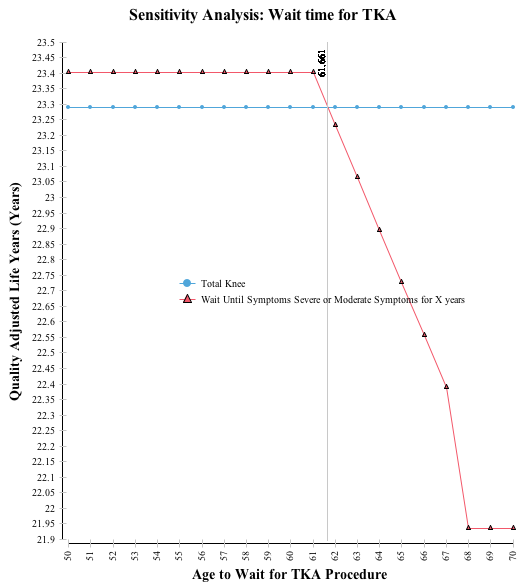Session Information
Title: Health Services Research, Quality Measures and Quality of Care - Innovations in Health Care Delivery
Session Type: Abstract Submissions (ACR)
Background/Purpose:
Total Knee Arthroplasty (TKA) reduces pain and restores mobility. However, replacement joints have limited durability and patients have to weight the benefits of having a knee replacement versus its lifespan, especially since revision arthroplasty has a higher complication rate and poorer outcomes. The objective of this study is to determine the trade-off between undergoing TKA versus delaying TKA and thereby reducing the chance of revision.
Methods:
A Markov state-transition model was constructed to assess wait-times in patients undergoing TKA. The model estimated the quality-adjusted-life-years (QALYs) for patients undergoing TKA at age 50 versus waiting until moderate or severe symptoms occur. The model simulated a hypothetical cohort of patients 50-years and older. The Western Ontario and McMaster Universities Arthritis Index (WOMAC) was used to classify mild, moderate and severe symptom levels. Probabilities and quality adjustment measures were extracted from published literature. Sensitivity analyses were performed on utilities for pain and wait time to undergo TKA. The model was simulated over the lifetime of an individual.
Results:
Compared to waiting until age 65, performing TKA at age 50 regardless of symptoms is the preferred strategy [22.73 QALYs versus 23.29 QALYs]. However, sensitivity analysis demonstrates that waiting is preferred for mild pain when utility is greater than 0.85; and moderate pain when utility is greater than 0.72. In patients with severe pain TKA is always favored over waiting. For a 50-year old patient with mild pain the natural history of osteoarthritis suggests progression to moderate or severe pain. Thus, our model indicates that patients presenting with mild pain will wait an average of 11.7 years (age 61.7 years; 23.40 QALYs) for TKA in order to maximize expected utility.
Conclusion:
TKA is the preferred strategy in individuals with severe knee pain. For patients having mild pain, it is preferable to wait until moderate or severe pain develops.
Disclosure:
D. Tulanont,
None;
H. Vora,
None;
R. Akkineni,
None;
D. A. Albert,
None.
« Back to 2013 ACR/ARHP Annual Meeting
ACR Meeting Abstracts - https://acrabstracts.org/abstract/timing-of-total-knee-arthroplasty-a-decision-analysis/

